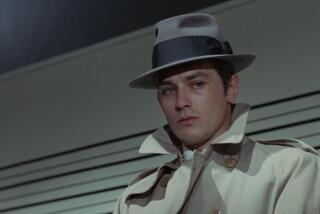Review: Joseph Losey’s 1976 classic ‘Mr. Klein’ starring Alain Delon still enthralls
The shock of seeing Joseph Losey’s newly restored, long unavailable “Mr. Klein” is not so much surprise at how compelling it is but astonishment at how it seems more relevant today than it did at its original 1976 release.
Moody, elegantly disturbing and impeccably made by a master director, this story of blurred identities and casual immorality in German-occupied Paris benefits from what might be the best performance of star Alain Delon’s long career as well as potent cameos by Jeanne Moreau, Michel Lonsdale and Juliet Berto.
The movie’s gifts were acknowledged at the time, with Césars for film, director and production design (by the legendary Alexandre Trauner) as well as nominations in four other categories.
But there was criticism as well for Losey as an expatriate American (in Europe fleeing the Hollywood blacklist) making a French language film set against one of that country’s darkest moments, the Vel d’Hiv roundup.
That 1942 event saw French police, not German soldiers, carrying out a mass arrest of some 13,000 foreign Jews living in Paris, something that no one expected and few survived.
Losey, working largely with “Battle of Algiers” screenwriter Franco Solinas (though Costa-Gavras and Fernando Morandi also worked on the script), said that his experience with the blacklist years influenced the wartime atmosphere of desperation and despair he created.
The aim of the prevailing cultural mood in both periods, he said in an interview with critic Michel Ciment, “is to make everybody on the street so frightened that they won’t even remotely engage in any kind of activity.”
What this means in practice is that the story arc of “Mr. Klein” is anything but a world of simplistic finger pointing.
Instead, using the elliptical style of earlier movies like “The Servant” and “Accident,” Losey created a Kafkaesque world where everyone is vulnerable and no one is on safe ground, a world where nothing is certain, not even your own identity. Especially your own identity.
In the Paris of 1942, Robert Klein is introduced as the master of all he surveys, an art dealer taking advantage of Jews desperate for cash to leave the country by buying their collections at bargain prices.
At his ease in his opulent apartment, wearing a florid dressing gown with a complaisant mistress (Berto) waiting in his bedroom, the opportunistic Klein provides Delon, one of France’s biggest stars who often graced commercial thrillers, a chance to focus on a different kind of role.
No one could do pitiless men in a pitiless world better than Delon, an actor who held the screen without apparent effort. But in “Mr. Klein,” he is equally good at providing an acute psychological portrait of what happens when the façade begins to crack, when ground that seemed firm underfoot proves to be less so.
It all begins when a Jewish newspaper addressed to Robert Klein by name lands on his doorstep. In a world where no mistake can be assumed to be innocent, a world where “Jews Forbidden” signs are posted on café doors, this minor incident is a fly in Klein’s ointment, and he becomes increasingly obsessed with figuring out why it happened.
It is one of the conceits of “Mr. Klein” that the more the man investigates, visiting first the newspaper’s office and then the unnerving Commission for Jewish Affairs, the more confusing and ominous things get.
Klein’s request for information is met with resistance not assistance, and rather than clearing his name, his persistence leads to investigations and suspicion.
Some factual information eventually emerges, but the most compelling thing about “Mr. Klein” is its intentional air of mystification, that spelling everything out is not on its agenda.
Though it is filled with dramatic incidents, this is finally a dazzling film about mood, about creating an unnerving world where feeling safe turns out to be an illusion, where everyone is at risk whether they know it or not. If that doesn’t sound like a film for today’s world, I don’t know what does.
In French with English subtitles
Not rated
Running time: 2 hours, 3 minutes
Playing: Laemmle Royal, West Los Angeles: Laemmle Playhouse 7, Pasadena; Laemmle Town Center, Encino; The Frida Cinema, Santa Ana
More to Read
Only good movies
Get the Indie Focus newsletter, Mark Olsen's weekly guide to the world of cinema.
You may occasionally receive promotional content from the Los Angeles Times.











